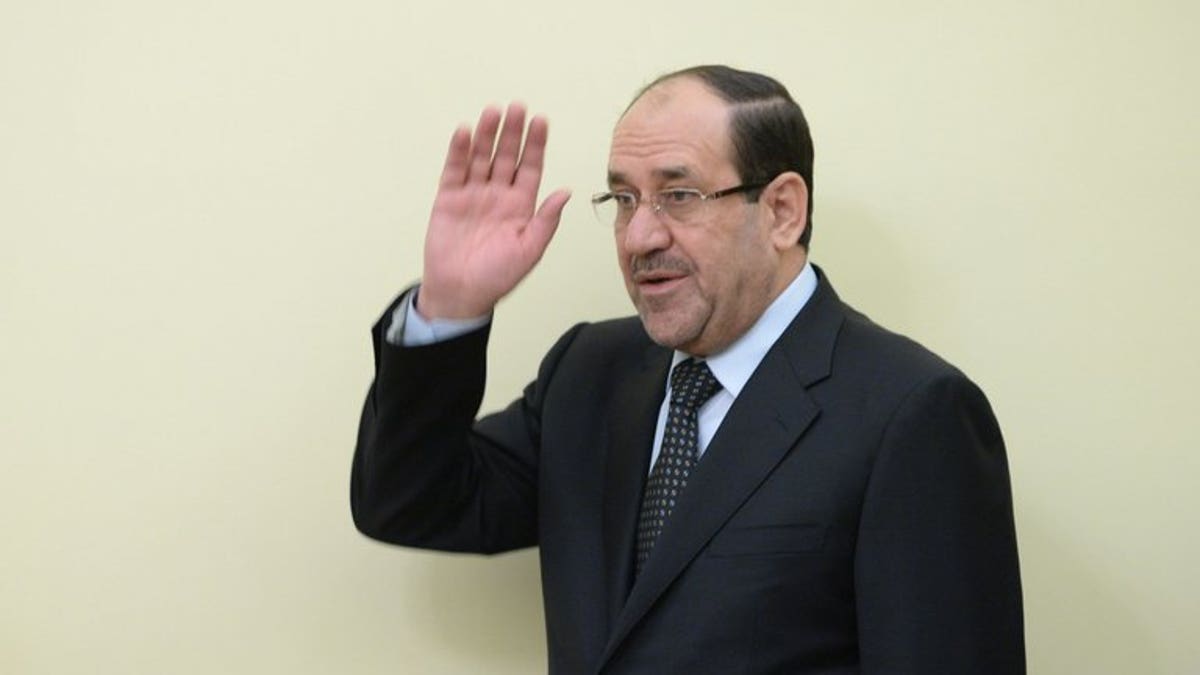
Iraqi Prime Minister Nouri al-Maliki waves as he arrives for an agreement signing with Indian Prime Minister Manmohan Singh in New Delhi on August 23, 2013. Iraq's prime minister on Friday pitched for investment from India to rebuild his war-shattered nation, which is a critical energy supplier to New Delhi. (AFP)
NEW DELHI (AFP) – Iraq's prime minister on Friday pitched for investment from India to rebuild his war-shattered nation, which is a critical energy supplier to New Delhi.
Iraq's Prime Minister Nuri Al-Maliki said there were "great opportunities" for Indian firms to rebuild the nation's infrastructure -- constructing ports, highways, housing, railways, schools, hospitals and investing in oil production facilities.
"There is so much potential," said Maliki, who is on a three-day trip to New Delhi and Mumbai.
Iraq is still struggling to rebuild its broken infrastructure since a 2003 US-led invasion ousted president Saddam Hussein and led to massive sectarian violence.
This is the first head of government-level visit between the two countries since 1975, when then-prime minister Indira Gandhi visited Iraq.
During the visit, the two sides were expected to sign an agreement that would increase Iraqi sales of crude oil to fuel-import reliant India.
Iraq has eclipsed sanctions-hit Iran as India's second-biggest crude oil supplier after Saudi Arabia.
India reduced its dependence on Iranian oil in the wake of US and European sanctions on the import of oil from the Islamic Republic.
India and Iraq have historically enjoyed friendly ties.
But while China has been energetically seeking infrastructure contracts in Iraq, and has invested substantially in Iraqi oil production, Iraq officials say India has been noticeably absent.
Iraq has said it may need up to $1 trillion over the next decade to rebuild its crumbling infrastructure.
"We are rebuilding our country," said Maliki, whose visit followed a trip to Baghdad by Indian foreign minister Salman Khurshid in June.
Luring foreign investment to Iraq has been complicated anew by the worst violence in the country since 2008.
"We have some security breaches here and there," conceded the chairman of Iraq's National Investment Commission, Sami Raouf Taqi al-Araji.
But he said the country had special forces protecting foreign workers.
"We're committed to protecting foreign workers, they are away from their homes, they are in our care," Araji told reporters.
Despite tensions, Iraq's economy has been growing, fuelled by oil exports.
Indian exports to Iraq totalled around $1.3 billion in 2012, up from $740 million in 2011, according to an Indian government official.
Baghdad's exports to India -- the vast majority of which were oil -- totalled more than $20 billion last year, up from $9 billion a year earlier in 2011.
India has said it is keen to "reverse the traffic" by investing in Iraqi infrastructure and moving to a more broad-based relationship.
The country, struggling to stabilise its ailing currency, is also pushing Iraq to accept payment for its oil exports in rupees, Indian trade minister Anand Sharma said Friday.
Araji said Iraq would have to consider the request.
Iran, which has long battled neighbouring Iraq for global oil market share, agreed to take payments for the oil it sells to India in rupees after Western sanctions over its disputed nuclear program blocked other payment methods.
